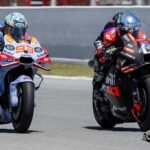An in-depth exploration into the process by which satellite MotoGP teams select their manufacturer sheds light on the fairness of Ducati fielding eight bikes.
Desmosedicis currently occupy 36% of the MotoGP grid. While Gresini’s affiliation is secure until the end of 2025, Ducati’s contracts with Pramac and VR46 expire this season.
Yamaha, limited to a factory entry since 2022, seeks to bolster its presence by recruiting a satellite team for the upcoming season, aiming to double its grid presence.
Since 2016, Ducati has consistently fielded eight bikes, a practice echoed by other manufacturers in the past. However, the Desmosedici’s competitive edge, marked by consecutive titles, reignites discussions on whether a cap on manufacturer bike allocations should be enforced.
While supporting eight riders poses significant logistical challenges, it offers substantial advantages in data collection and testing.
Herve Poncharal, owner of the GASGAS Tech3 team, emphasized the role of the free market in team and manufacturer relationships. He stated in an interview with Crash.net last year, “Dorna cannot impede an Independent team from selecting their preferred bikes if a manufacturer is willing to supply them. It’s a free market.”
Poncharal further elaborated, “Independent teams are private entities, empowered to choose the best bikes based on factors like cost, factory support, performance, and reliability. Interfering with this autonomy could disrupt their operations and undermine their business interests.”
“It wasn’t Ducati’s initial plan to field eight bikes, I believe, but when approached by the teams, they agreed and have effectively managed the situation. Importantly, none of the bikes are subpar. It represents a significant investment in terms of logistics, manpower, and finances.”
MotoGP’s vision of the “ideal grid” did not come to fruition
Although Dorna aimed to have each of the six previous manufacturers supporting a satellite team, some factories hesitated despite the promise of additional financial backing from the commercial rights holder.
Hervé Poncharal, also the president of the teams’ association IRTA, clarified, “Dorna incentivizes factories to supply satellite bikes with a financial ‘carrot’.” He explained, “If a manufacturer only operates a factory team with two bikes, they receive a certain amount of financial support. However, if that same manufacturer also runs a satellite team, they receive additional funding.”
He continued, “Dorna’s preference, and the ideal scenario when there were six manufacturers, was for each of them to have both a factory and a satellite team. Six manufacturers, four bikes each, totaling 24 riders. It was the ideal grid, but unfortunately, it didn’t come to fruition.”
“Dorna and the teams exerted considerable effort to persuade every manufacturer to support a satellite team,” Poncharal noted. “However, some manufacturers were more willing to participate than others. Additionally, we must respect the decisions of manufacturers who choose not to operate a satellite team.”
Furthermore, Poncharal highlighted that independent teams pay a lease fee of several million euros per rider to their manufacturer for satellite machinery, a cost effectively covered by Dorna. “A factory with a satellite team receives more financial support from the promoter, in addition to the lease fee for the bikes paid by the satellite team,” he emphasized.
He emphasized that Dorna’s funding comes with no conditions attached, and satellite teams are free to lease machinery from any manufacturer they choose.
The Absent Are Always At Fault

Formerly viewed as a burden on factories, a satellite team is now considered a vital component of a competitive MotoGP endeavor.
“Now, more and more manufacturers understand that having a satellite operation isn’t a hindrance, as previously thought,” remarked Poncharal in a 2023 interview. “It’s advantageous because it enables grooming young riders for the future and provides additional feedback and data, especially with reduced testing opportunities.”
“I believe Aprilia is content with their four bikes, and Yamaha is actively seeking a new satellite venture,” Poncharal continued. “In the near future, I anticipate every factory will have a satellite team. However, at present, Ducati’s contribution has been more beneficial than detrimental to the championship.”
Should another manufacturer seek to lure a team away from Ducati, they’ll need to present a superior overall package. In essence, if their bike isn’t as competitive as the Desmosedici, other incentives such as enhanced factory support, reduced leasing costs, and a longer-term partnership could sway the decision.
“As the French saying goes, ‘the absent are always at fault’,” noted Poncharal. “If you lack a satellite team, it’s either because you choose not to or because you’re unable to offer a competitive package—both on and off the track.”
Poncharal emphasized the importance of considering the proximity and level of support from the manufacturer when negotiating. “I’m delighted with Pierer Mobility,” he stated. “With a five-year deal, I can plan and invest, unlike with a one-year deal where uncertainty looms.”
He highlighted the improved position of independent teams, many of whom have direct contracts with their factories and access to factory-spec bikes.
Reflecting on history, Poncharal recalled periods when Honda and Yamaha had eight MotoGP bikes each without complaints. Currently, Ducati boasts eight entries divided among Factory, Pramac, VR46, and Gresini teams, while other manufacturers have a factory and satellite team setup.
Contracts for three satellite teams—LCR (Honda), Pramac (Ducati), and VR46 (Ducati)—expire at the end of the 2024 season. Amid speculation of closer VR46-Ducati cooperation, Pramac, currently leading this year’s standings, is also reportedly in talks with Yamaha.
Both Pramac and VR46 have the option to remain with Ducati next season, should they choose to do so.
Stay tuned with We4GP for more news.











